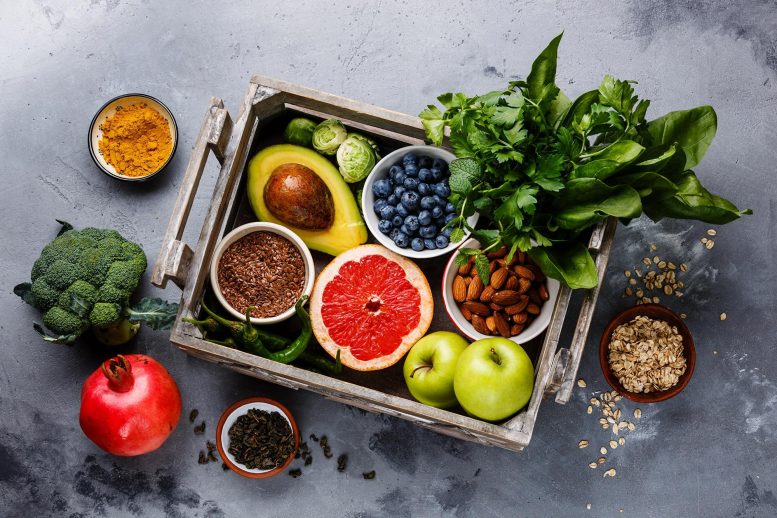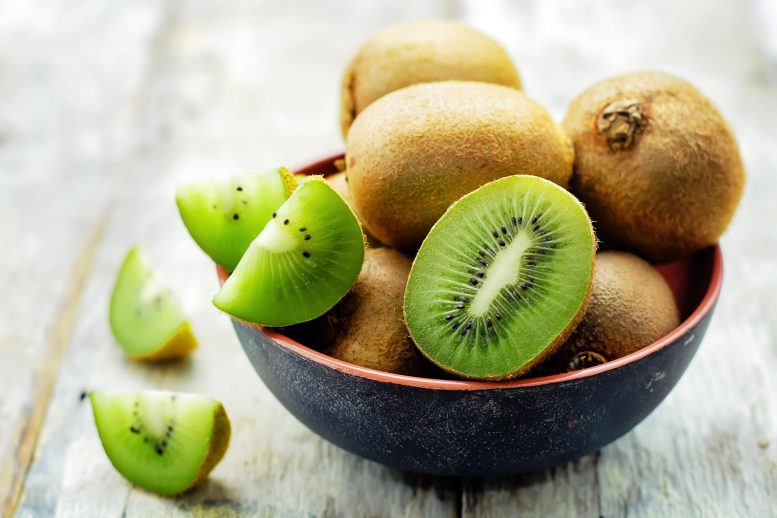Happiness Is a Salad: Strong Correlations Between What We Eat and How We Feel

There are strong correlations between what we eat and how we feel, according to the relatively new field of nutritional psychiatry, and healthy food is happy food.
Many of us — in the West, at least — seem to suffer from what psychologists call the “Unhealthy = Tasty Intuition”: we subconsciously assume that healthy foods are not as tasty, enjoyable, or satisfying as unhealthy foods.[1] This belief seems to lead to a particular dislike for vegetables[2] and, although it is not shared by everyone — specifically, not by people who enjoy eating and are interested in health[3] — recent research suggests that, due to rapid globalization and urbanization, the beliefs that we have about food are converging across many different cultures.[4]
For the most part, it seems, many of us will go out of our way to avoid wholesome foods, even if we want to eat healthily.[5] This is unfortunate because, according to the relatively new field of nutritional psychiatry, there are strong correlations between what we eat and how we feel, and healthy food is happy food.

The effect of fruits and vegetables on mood was investigated in a meta-analysis of studies from seven countries. It discovered strong evidence that people who eat vegetables and fruits have better psychological and physical health.
A handful of greens keeps the blues away
In 2021, a meta-analysis of studies from seven countries that specifically investigated the impact of fruits and vegetables on the mood of people aged between 15 and 45 found strong evidence that individuals who eat vegetables and fruits enjoy better psychological — as well as physical — well-being.[6] In fact, research has consistently found that, compared with diets rich in sugar and fats and woefully short on veggies — so-called “Western diets” — those that are rich in vegetables, fruit, and unprocessed grains can reduce the risk of depression by up to 35 percent.[7] The positive effect of healthy eating on happiness seems to be universal; from America to France to Russia and beyond[8], people of all ages, sexes, and races feel happier after eating their recommended daily servings of fruit and vegetables.
The mental health benefits of eating fruit and vegetables are not to be sniffed at. A recent study that examined the eating habits of over 12,000 Australians aged 15 years and older over a period of several years found that people who went from eating no fresh produce to eating some every day reported an increase in happiness and life satisfaction equivalent to what an unemployed person feels after finding work. The authors concluded, “These findings are consistent with the idea that eating certain foods is a form of investment in future happiness and well-being.”[9]

Eating fresh fruits and vegetables may quickly produce psychological benefits.
Psychological benefits can be achieved quickly: one study of 100 university students found that choosing a piece of fruit — an apple, large clementine, or banana — instead of chocolate wafers or potato chips to snack on every day reduced fatigue and anxiety in just 10 days.[10] Another study using data from daily food diaries kept by 281 students who were tracked over a 3-week period found that people who ate a lot of fruits and vegetables on one day reported greater emotional well-being on the next day.[11]
Fruit and veggies also provide more immediate happiness than other food groups according to a 2017 study from Germany. For eight days, 38 university students were asked to report what they were eating and how much pleasure it gave them real-time via an app on their cellphones. The researchers found that, among 14 different food categories, vegetables accounted for the most “in the moment” eating happiness, followed by grain products like bread, pasta, and cereals, and only then by unhealthy snacks like sweets, chips, and pastries.[12]
In short, a handful of M&Ms might make you feel good, but a handful of grapes will probably make you feel better. This may sound counter-intuitive, but recent research has also effectively demonstrated that we don’t know what kind of foods will make us happy.[13]

Better health does not fully explain the effect of healthy eating on happiness. This means that eating well has an impact on happiness in other ways.
How does it work?
We know that healthy eating will add to good health and that good health will add to happiness. However, the effect of healthy eating on happiness is not fully explained by better health. This means that healthy food affects happiness in other ways.
How, exactly, eating your 5-a-day will make you a happier person is not yet known, but there are several theories.[14] Fruits and vegetables are rich sources of B vitamins, notably folate. Folate plays an important role in the production of neurotransmitters like serotonin, dopamine, and epinephrine, all of which play a critical role in mood regulation. Fruits and vegetables also contain minerals like iron, calcium, and magnesium that have all been positively linked to psychological health,[15] and they are rich in antioxidants like vitamins C and E and polyphenols which protect against oxidative stress that can be bad for mental health. In one study, eating just 2 kiwi fruit a day for six weeks was enough to produce a measurable increase in vitamin C levels and a corresponding improvement in the mood of 35 healthy young men. After their kiwi cure, the men who had reported feeling unhappy at the beginning of the study all reported feeling significantly more cheerful, energetic, and lively at the end.[16]

A measurable increase in vitamin C levels and a corresponding improvement in mood were achieved by eating just two kiwi fruit per day for six weeks, according to a research study.
Nutritional psychiatrists also believe that there is a link between how you feel and the kinds of bacteria that live in your gut. The “good” bacteria that make up your intestinal microbiome affect the degree of inflammation throughout your body, as well as your mood and energy level. These bacteria love snacking on high-fiber foods like fruits and vegetables. When they metabolize their meals, they create by-products — one of those by-products is the feel-good neurotransmitter serotonin. In fact, about 95% of your serotonin is produced in your gastrointestinal tract.
Finally, some research has shown that simply knowing that the food they are eating is healthy is enough to make some people feel happier.[17] Ultimately, it is probably a combination of all these reasons and perhaps a few more that we currently don’t know about that explains how produce promotes happiness.

Most happiness appears to be achieved by eating more than three portions of fruit and vegetables per day.
An apple a day is a good start
More than three portions of fruit and vegetables per day seem to produce the most happiness, though how many more and for what kind of people is not yet established. An analysis of the survey data of 80,000 Brits concluded that people reached peak well-being at around 7 portions of fruit and vegetables per day.[18] But, although the more fruits and greens you eat, the better your mental well-being is likely to be, you don’t have to get carried away: even one extra daily portion of fruit or vegetable has been shown to improve a person’s feelings of well-being.[19]
Better psychological outcomes seem to be associated with the consumption of fresh fruit and raw vegetables rather than cooked vegetables.[20] In one study, students who ate less than 3 combined servings of fruit and vegetables per day were split into two groups and subjected to a 2-week healthy eating intervention. Those who ate high-quality raw produce showed improvements in their psychological well-being, whereas those who ate their vegetables cooked in casseroles or mixed into their main meals did not.[21]

Fresh fruit and raw vegetables, rather than cooked, appear to be associated with better psychological outcomes.
At the end of the day, the important takeaway is that, raw or cooked, fruit and veggies will improve the quality of your life. Research indicates that good cheer is boosted by the cumulative effects of a broad spectrum of vitamins, minerals, and antioxidants, rather than from any single nutrient. So the best way to avoid the blues is to eat your way through a rainbow of vegetables and fruit. Veggie-avoiders, don’t despair; you can start small, perhaps by adding some berries to your breakfast or some spinach to your lunch wrap, and go from there. Bon appétit and good mental health!
References:
- Raghunathan, R., Naylor, R. W., & Hoyer, W. D. (2006). The Unhealthy = Tasty Intuition and Its Effects on Taste Inferences, Enjoyment, and Choice of Food Products. Journal of Marketing, 70(4), 170-184.
- Briers, B., Huh, Y. E., Chan, E., & Mukhopadhyay, A. (2020). The unhealthy = tasty belief is associated with BMI through reduced consumption of vegetables: A cross-national and mediational analysis. Appetite, 150, 104639.
- Haasova, S., & Florack, A. (2019). Practicing the (un)healthy = tasty intuition: Toward an ecological view of the relationship between health and taste in consumer judgments. Food Quality and Preference, 75, 39-53.
- Cooremans, K., Geuens, M., & Pandelaere, M. (2017). Cross-national investigation of the drivers of obesity: Re-assessment of past findings and avenues for the future. Appetite, 114, 360-367.
- Mai, R. & Hoffmann, S. & Hoppert, K. & Schwarz, P. & Rohm, H. (2014). The spirit is willing, but the flesh is weak: The moderating effect of implicit associations on healthy eating behaviors. Food Quality and Preference, 39, 62-72.
- Dharmayani, P., Juergens, M., Allman-Farinelli, M., & Mihrshahi, S. (2021). Association between Fruit and Vegetable Consumption and Depression Symptoms in Young People and Adults Aged 15-45: A Systematic Review of Cohort Studies. International journal of environmental research and public health, 18(2), 780.
- Ljungberg, T., Bondza, E., & Lethin, C. (2020). Evidence of the Importance of Dietary Habits Regarding Depressive Symptoms and Depression. International journal of environmental research and public health, 17(5), 1616.
- Veenhoven, R. (2021). Will Healthy Eating Make You Happier? A Research Synthesis Using an Online Findings Archive. Applied Research Quality Life, 16, 221-240.
- Mujcic, R., & J Oswald, A. (2016). Evolution of Well-Being and Happiness After Increases in Consumption of Fruit and Vegetables. American journal of public health, 106(8), 1504-1510.
- Smith, A.P., & Rogers, R. (2014). Positive effects of a healthy snack (fruit) versus an unhealthy snack (chocolate/crisps) on subjective reports of mental and physical health: A preliminary intervention study. Frontiers in Nutrition, 1, 1-5.
- White, B. A., Horwath, C. C., & Conner, T. S. (2013). Many apples a day keep the blues away — daily experiences of negative and positive affect and food consumption in young adults. British journal of health psychology, 18(4), 782-798.
- Wahl, D. R., Villinger, K., König, L. M., Ziesemer, K., Schupp, H. T., & Renner, B. (2017). Healthy food choices are happy food choices: Evidence from a real life sample using smartphone based assessments. Scientific reports, 7(1), 17069.
- Villinger, K., Wahl, D. R., König, L. M., Ziesemer, K., Butscher, S., Müller, J., Reiterer, H., Schupp, H. & Renner, B. (2020). Do we know what we enjoy? Accuracy of forecasted eating happiness. Frontiers in Psychology, 11, 1187.
- Rooney, C., McKinley, M., & Woodside, J. (2013). The potential role of fruit and vegetables in aspects of psychological well-being: A review of the literature and future directions. Proceedings of the Nutrition Society, 72(4), 420-432.
- Kaplan, B. J., Crawford, S. G., Field, C. J., & Simpson, J. S. (2007). Vitamins, minerals, and mood. Psychological bulletin, 133(5), 747-760.
- Carr, A. C., S. M. Bozonet, J. M. Pullar and M. C. M. Vissers. 2013. Mood improvement in young adult males following supplementation with gold kiwifruit, a high-vitamin C food. Journal of Nutritional Science 2:e24.
- Lattimore, P., Walton, J., Bartlett, S., Hackett, A., & Stevenson, L. (2010). Regular consumption of a cereal breakfast. Effects on mood and body image satisfaction in adult non-obese women. Appetite, 55(3), 512-521.
- Blanchfower, D. G., Oswald, A. J. & Stewart-Brown, S. (2013). Is psychological well-being linked to the consumption of fruit and vegetables? Social Indicators Research, 114(3), 785-801.
- Ocean, N., Howley, P., & Ensor, J. (2019). Lettuce be happy: A longitudinal UK study on the relationship between fruit and vegetable consumption and well-being. Social science & medicine (1982), 222, 335-345.
- Brookie, K. L., Best, G. I., & Conner, T. S. (2018). Intake of Raw Fruits and Vegetables Is Associated With Better Mental Health Than Intake of Processed Fruits and Vegetables. Frontiers in psychology, 9, 487.
- Conner, T. S., Brookie, K. L., Carr, A. C., Mainvil, L. A., & Vissers, M. C. (2017). Let them eat fruit! The effect of fruit and vegetable consumption on psychological well-being in young adults: A randomized controlled trial. PloS one, 12(2), e0171206.












